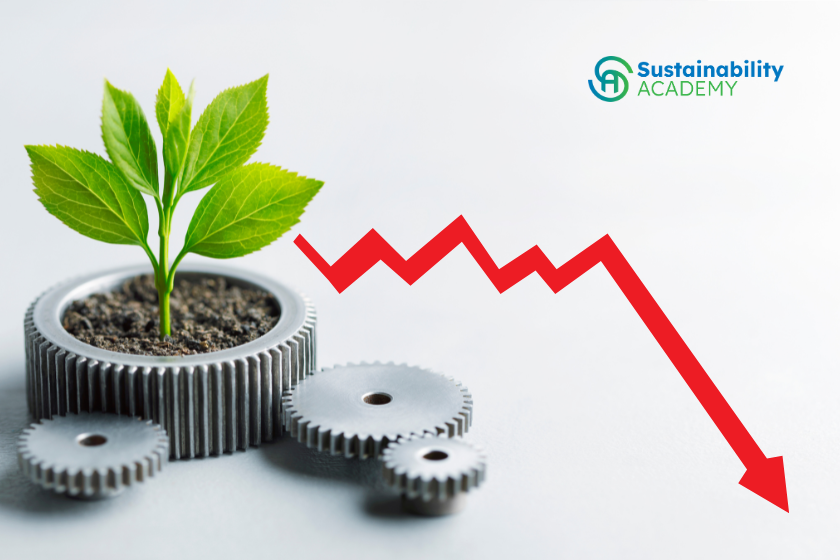ESG Recession? What ESG Professionals Should Know
“Sustainability is out. Climate is in.”
This bold declaration by Tim Mohin—a veteran in the sustainability field—has ignited a growing debate. Has sustainability lost its corporate appeal? Are we in a so-called “ESG recession”? And what does this mean for ESG professionals navigating global climate goals, regulatory pressures, and green skills expectations?
Let’s unpack what’s behind this shift—and why now is a critical time to deepen ESG expertise through practical, recognized training.
What Is a “Sustainability Recession”?
The term “sustainability recession” doesn’t refer to an economic downturn. Instead, it suggests a decline in corporate enthusiasm and clarity around sustainability initiatives.
As reported by ESG & Climate News, companies are continuing to invest in climate-related actions. However, they are increasingly avoiding ESG-labeled communication strategies. This strategic silence—also known as greenhushing—is a response to rising litigation risk, regulatory complexity, and politicized backlash, especially in the U.S.
Three main forces are shaping this phenomenon:
- Regulatory confusion (particularly around EU and U.S. ESG disclosures)
- Fear of being accused of greenwashing
- Economic volatility, pushing boards to reprioritize
Yet, amid these challenges, regulatory frameworks are becoming stricter, not looser.
CSRD, ESRS & Mandatory ESG Reporting
While some corporate leaders may feel uncertain, lawmakers in the EU are charging ahead. The new Corporate Sustainability Reporting Directive (CSRD) mandates ESG disclosures from nearly 50,000 companies, both EU-based and global.
According to the latest EFRAG State of Play 2025 Report, organizations must align their disclosures with European Sustainability Reporting Standards (ESRS). These include detailed requirements for:
- Double materiality
- Climate risk metrics
- Social and governance data
- Sector-specific disclosures (starting 2026)
Additionally, countries like Canada, Singapore, and the UK are aligning with the ISSB’s global sustainability standards (IFRS S1 and S2). In the U.S., the SEC has finalized its climate-related disclosure rule, requiring public companies to report on emissions and risks.
The message is clear:
🛑 An ESG recession in messaging does not mean a pullback in regulation.
ESG Reporting Professionals Are in High Demand
Despite media headlines questioning ESG’s future, demand for trained ESG professionals continues to grow.
The LinkedIn Global Green Skills Report highlights a sharp rise in ESG-related job postings, especially in Europe and Asia. Roles like:
- ESG data analysts
- Sustainability reporting managers
- Climate risk officers
- ESG consultants
…are becoming central to corporate strategy.
For professionals looking to break into or advance in ESG roles, the Online Certificate on Sustainability (ESG) Reporting offers practical, up-to-date knowledge on CSRD, GRI, SASB, and TCFD frameworks.
The course is ideal for:
- Consultants
- Accountants
- Compliance officers
- Communications and sustainability teams
It focuses on translating evolving standards into effective reports and KPIs—something few internal teams are currently equipped to handle without upskilling.
Climate Risk & Carbon Strategy Are Not Optional
While ESG language may be shifting, the climate emergency is not.
July 2025 witnessed a global wave of flooding disasters. As CNN reports, cities from Beijing to Berlin to Vermont experienced catastrophic climate events. This summer alone displaced millions and caused billions in damages.
With climate impacts worsening and new policy tools like the EU Carbon Border Adjustment Mechanism (CBAM) rolling out, it is no longer enough to write broad “climate pledges.”
Companies need:
- Detailed Scope 1–3 carbon accounting
- Carbon neutrality or Net Zero strategies
- Climate risk integration into financial filings
This is where the Online Certificate on Carbon Reduction Strategy becomes essential. The course helps ESG professionals:
- Understand science-based targets
- Avoid greenwashing in carbon offsets
- Prepare credible carbon disclosures for regulators and investors
If your company is subject to CBAM, IFRS S2, or TCFD-style guidance, this course is no longer a “nice-to-have.” It’s a must.
Why ESG Training Matters Now More Than Ever
Even if the term “sustainability” is undergoing a brand shift, ESG-related knowledge is solidifying across regulations, investments, and corporate governance.
Professionals who can navigate both the compliance side (e.g., ESRS, SEC rules) and the climate action side (e.g., carbon strategies, TCFD-aligned risk management) will be best positioned to:
✅ Lead transformation
✅ Drive transparency
✅ Build organizational resilience
And with the EU’s scope expanding to non-European companies, no global firm can afford to sit this out.
Sustainability Isn’t Dying—It’s Maturing
Let’s be clear: there is no real ESG recession—only a reframing of how we talk about ESG. Reporting is becoming mandatory. Climate impacts are accelerating. And expectations from regulators and investors are only increasing.
For ESG professionals, now is the time to strengthen expertise, deepen reporting literacy, and master carbon metrics. Courses like:
- Online Certificate on Sustainability (ESG) Reporting
- Online Certificate on Carbon Reduction Strategy
…offer practical, globally respected pathways to do just that.
Because no matter how the headlines read—the sustainability transition is here to stay.

